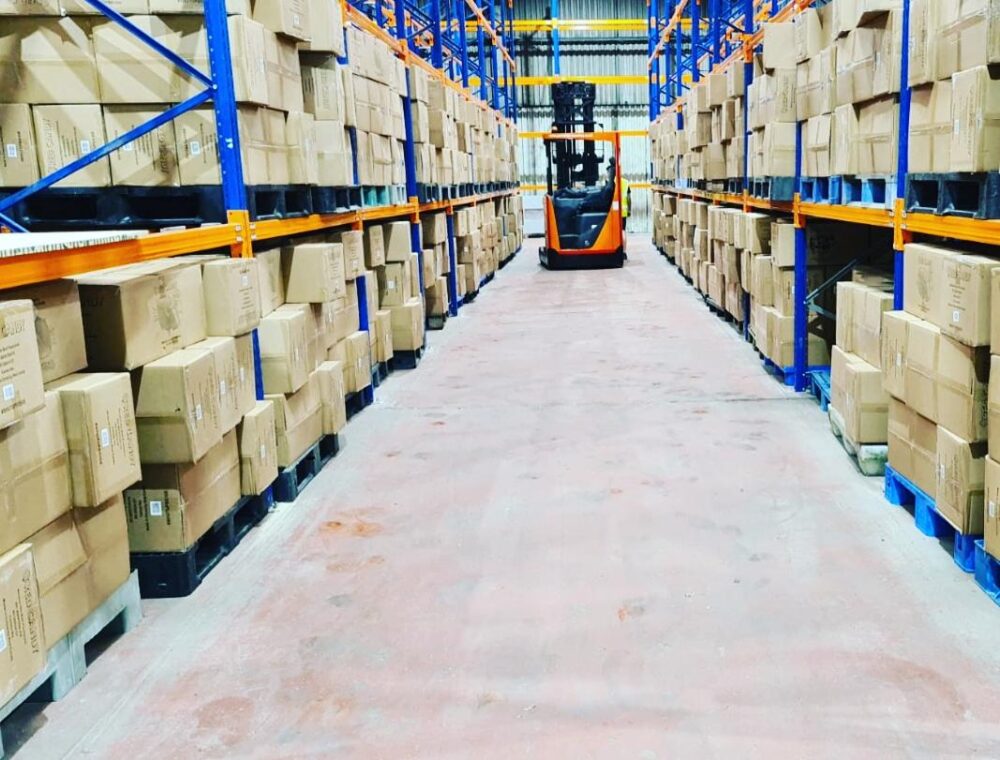Rapid growth in e-commerce presents plenty of opportunity for retailers but can also prove a big challenge that leaves small and medium-sized businesses behind. Paul Taylor, chief operating officer at international fulfilment services provider fulfilmentcrowd, looks at how e-commerce retailers can effectively scale-up, so that demand doesn’t outpace supply.
The most recent ONS Retail Sales data (Great Britain, January 2022) shows that the proportion of online sales in the UK stands at 25.3%. This remains up on February 2020 when, prior to COVID-19 impacting the UK, the proportion of online sales stood at 19.8%.
 Growth is being driven by a trend of shoppers migrating online, increasing the volume of goods they are buying, the types of products they are purchasing and their frequency of e-commerce transactions. This can leave SME retailers scrambling to keep up.
Growth is being driven by a trend of shoppers migrating online, increasing the volume of goods they are buying, the types of products they are purchasing and their frequency of e-commerce transactions. This can leave SME retailers scrambling to keep up.
Look beyond more people
Smaller and medium-sized e-commerce retailers may not always have the capability to deal with rapidly increasing sales. All too often, businesses will look to expand teams as the answer for satisfying growing demand. The notion being that having more people can help effectively handle increasing volumes.
The investment in staff is intended to avoid bottlenecks of customer orders, with the key objective of safeguarding consumer satisfaction and brand loyalty against the negative effects of delayed and missed orders. E-commerce shoppers want their products on time and in perfect condition, which can become even more challenging to achieve during scaling up. Adding more employees to pick, pack and deliver orders doesn’t always solve this problem and can take a long time to yield the results that retailers require immediately.
New employees often need training and a period of adjustment, as they get used to processes. This can be made even more challenging when new starters join during a busy sales period, with order volumes quickly stacking up. Additional staff can end up causing more issues, as they consume existing resource and take it away from the all-important goal of getting orders ready and out for delivery.

An outsourced solution
Rather than investing in more staff, fast-growing e-commerce retailers are starting to realise that outsourcing to a third-party fulfilment provider is a feasible and viable option.
Previously, such fulfilment outsourcing hasn’t always been deemed practical or achievable for SME retailers on scale-up journeys because the market had tended to cater more for high volume output businesses. This has meant e-commerce retailers, which are quickly going from selling a couple of hundred to a few thousand orders per week, have found themselves unable to meet the minimum quantity requirements of traditional fulfilment providers. This has left SME retailers in limbo and seeking other alternatives – in addition to adding more staff – for handling increasing order volumes.
One such alternative is getting rid of the ‘added-extras’ during order processing. Any personalisation, which smaller retailers had the time and agility to add to packaged orders to create a special touch, will be eliminated for the sake of saving time.
Removing the personalisation that defines and sets a brand apart can quickly impact customer satisfaction, perception and loyalty. Many consumers value the personal touch of SME businesses, and if they feel this is being lost, shoppers can quickly feel less compelled to buy again from the same retailer.
Fast-growing e-commerce retailers no longer have to make such compromises. Advances in technology, and the cloud in particular, mean fulfilment can be specifically tailored to meet the needs of SMEs. Through the innovative development of technology and bespoke software, fulfilmentcrowd makes a wide range of picking, packing and delivery services accessible and affordable for rapidly scaling e-commerce retailers.
Simple, low pricing and low order-quantity options have been specially created just for SMEs. These combine all the delivery choices that consumers typically expect of a large retailer, such as next day delivery and international shipping, with the personalisation, which shoppers associate with smaller, independent retailers and brands.
For a fast-growing furniture business, ensuring reliable shipping is crucial. Consider local warehousing, collaborate with reputable national and international carriers, and offer white glove delivery for larger items. Implement real-time tracking, flexible shipping options, and insurance. Have a customer-friendly returns policy and invest in sturdy packaging. Optimize inventory management, maintain excellent customer support, and continuously monitor and improve the shipping process for enhanced customer satisfaction.
Outsourcing shipping to a reliable company offers advantages such as expertise, cost efficiency, scalability, and a focus on core business activities. It provides access to a global reach, risk mitigation, technology integration, and flexibility, and can enhance customer satisfaction. Additionally, outsourcing reduces the administrative burden associated with managing shipping logistics internally. Careful selection of a reputable shipping partner and effective communication are essential for a successful outsourcing arrangement. Learn more about shipping options at UPakWeShip.
Ultimately, the SME-specific solution allows e-commerce retailers to completely outsource the fulfilment of customer orders, to avoid making compromises when scaling-up. In most cases, fast-growing businesses will be able to enhance customer service and satisfaction. They can retain the look and feel of order processing, before growth started to impact their business, and improve this through sophisticated stock inventory management software.
Making data-led decisions
Typically, having the ability to manage and check customer orders via a mobile app would be beyond the budgets and capabilities of most scale-up retailers. However, it’s exactly this type of instantly accessible data that fast-growing retailers need. The ability to review stock inventory management at the touch of a button and from almost anywhere, allows retailers to meet the real-time demands of an always-on customer base. fulfilmentcrowd’s smart phone app has been designed with this in mind and provides e-commerce retailers with complete transparency and control over their customer orders.
The app, backed up by an expert in-house team and cloud technology, delivers the functionality and connectivity of a supply chain management strategy that would usually be the preserve of large retailers with big budgets and teams. It can provide access to valuable stock inventory data that can be utilised to improve forecasting, pinpoint efficiencies, and quickly rectify any problems. Further benefits are reaped from the availability of fulfilmentcrowd’s in-house team of app developers. It enables a more agile approach to developing the service in line with SME feedback and requirements, while also encouraging a continuous and proactive approach to innovation. Readily available software expertise also means any issues can be quickly rectified to maintain service levels. Combined, these factors can help to further support rapid growth, whilst protecting customer satisfaction and brand loyalty against needless compromises.
Outsourcing the complete management of stock inventory is now possible for SME e-commerce retailers and can provide them with a solution that enables them to stay ahead of growth curves.
🏆
Creative Retail Awards - TICKETS NOW ON SALE!
19 September 2024, London
Join the excitement and prestige of the Creative Retail Awards, the ultimate celebration of innovation and excellence in retail, leisure and hospitality design, offering unparalleled opportunities for recognition, networking and celebration.
www.creativeretailawards.com



















